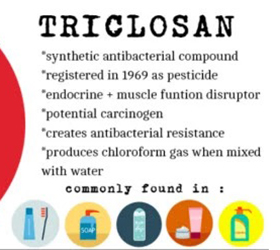
A common toothpaste ingredient, it destroys the gut microbiome and increases the risk of gut cancers.
Triclosan is another one of those chemicals that is finally on its way out even though we have known of its toxic effects for decades. After many decades of scientific scrutiny many companies are now removing TCS. Colgate removed triclosan from its Softsoap liquid handsoaps and Palmolive antibacterial dish liquid in 2011. Unfortunately, the big companies still deny it is a problem but are phasing it out because of public concerns citing “changing consumer preferences and superior formulations”. Interestingly the most recent research shows it is poisoning the gut.
Triclosan (TCS) is a biocide used as an antibacterial and antifungal agent in a number of consumer products such as toothpaste, mouthwash, disinfectants, soaps, hair products, skin creams (0.1%), feminine hygiene products, and cosmetics. Personal care products and cosmetics are the major source of exposure and studies on human subjects using TCS-containing cosmetics showed variable but significant amounts of TCS in their body fluids compared to controls.
Given the prevalence of triclosan in the environment, it is not surprising that measurable levels have been detected in just about every person even if you don’t use products with it on the label. TCS absorption and distribution are rapid in humans and detectable levels have been found in body fluids such as amniotic fluid, blood, breast milk and urine and TCS was detected in 100% of urine and 51% of cord blood samples in pregnant women in 181 expectant mothers from New York. TCS was also found in human tissues such as adipose tissue, brain, liver and nails.
Similar to all the research on the other endocrine disrupting chemicals (EDC’s) the latest science has shown that even small doses of TCS can significantly affect hormone functions, if they are delivered at the wrong moment. The endocrine-disrupting properties of TCS including its effects on estrogen, testosterone activity and disturbance of thyroid hormone action
Some toothpastes contain 3000 parts per million (ppm) TCS as the active ingredient and because of the high-volume use of this compound, the entire population is exposed to TCS at almost every stage of life. Because of the ubiquitous presence of TCS, there is an increasing concern regarding its impact on our human health.
This study found that levels typically found in toothpaste altered mouse gut microbiota and increased inflammation. Triclosan increased the severity of colitis symptoms and spurred colitis-associated colon cancer cell growth. Although the study is limited to mouse models, this work suggests that the effects of triclosan on human health should be examined more closely. This study shows that at relatively low doses Triclosan causes low-grade colonic inflammation, increases colitis, and exacerbates colitis-associated colon cancer in mice.
Together, these results demonstrate that this widely used antimicrobial ingredient could have adverse effects on colonic inflammation and associated colon tumorigenesis through modulation of the gut microbiota and inflammation.
For more information on toxic ingredients in personal care products see Dangerous Beauty or chemicals that poison the gut microbiome see Gut Secrets